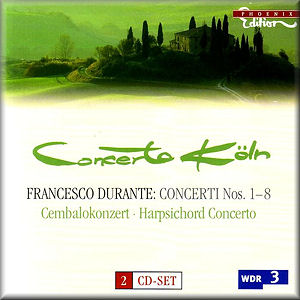 |
 |
|


alternatively
CD: AmazonUK
AmazonUS
Download: Classicsonline
|
Francesco DURANTE (1684 - 1755)
CD 1
Concerto No. 1 in F minor [13:31]
Concerto No. 2 in G minor [11:48]
Concerto No. 3 in E flat [09:58]
Concerto No. 4 in E minor [10:37]
Concerto No. 5 in A [07:39]
CD 2
Concerto No. 6 in A [09:55]
Concerto No. 7 in C [08:53]
Concerto No. 8 in A 'La Pazzia' [12:48]
Concerto for harpsichord, strings and bc in B flat* [09:28]
 Gerald Hambitzer (harpsichord) (*)
Gerald Hambitzer (harpsichord) (*)
Concerto Köln/Werner Ehrhardt
rec. 28-31 May 1990 (CD 1); 28-31 January 1992 (CD 2), Kulturforum,
Kempen (Niederrhein), Germany. DDD
 PHOENIX EDITION 427 [53:35 + 41:07]
PHOENIX EDITION 427 [53:35 + 41:07] 
|
|
|
Francesco Durante is one of the least-known
composers of the Italian baroque. His music isn't that often played,
in comparison to, for instance, that of Vivaldi. His music is
difficult to grasp, as it is so different from what one would
expect. In contrast to most of his contemporaries, and in particular
those from Naples where Durante worked most of his life, he composed
not a single opera. The largest part of his output is sacred,
and in addition he wrote various secular cantatas, a considerable
amount of keyboard music and some instrumental works.
Durante was born in Frattamaggiore, not far from Naples. Although his father was a woolcomber, he was also a singer in church. Most of his early musical training he probably received from his uncle, Don Angelo Durante, who took care of him when his father died in 1699. Don Angelo was a priest and musician and was primo maestro of the Conservatorio di S Onofrio a Capuana in Naples. In 1728 Francesco became primo maestro of the Conservatorio dei Poveri di Gesů Cristo. Very little is known about his life and activities before that. But the fact that he was elected to this post proves that he was held in high esteem. Among his pupils was Giovanni Battista Pergolesi.
In 1739 he resigned from his post, only to take up the same position at the Conservatorio di S Maria di Loreto in 1742, which he held until his death. Here he had again some famous pupils, including Tommaso Traetta and Antonio Sacchini. In 1745 he was appointed primo maestro at the Conservatorio di S. Onofrio, as the successor of Leonardo Leo.
As a composer he concentrated on writing sacred vocal music. He made some efforts in composing sacred dramas, but these were not received well, and as most of his output in this genre has been lost its quality is difficult to assess. In his church music there are some strongly conservative traits. He wrote several masses in the stile antico, and one of these was called Missa in Palestrina. At the same time his music also reflects the modern fashion, in regard to harmony, the use of chromaticism and dynamics.
These features come also to the fore in the eight so-called 'Concerti per quartetto', for two violins, viola, cello and basso continuo. Whereas most compositions of this kind in Durante's time follow a certain pattern, for instance in the number and order of movements, these Concerti seem to be completely independent of any tradition. The number of movements varies from three to six. The first two concertos begin with a movement in two sections, slow-fast.
Several movements are rooted in the past, like the canons in the Concerto No. 3 (largo staccato, canone amabile) and Concerto No. 6 (canone a tre). The second movement of Concerto No. 4 is even a 'ricercar del quarto tono', a common form of the 16th and 17th centuries. At the same time the concertos are full of expression, in particular in the slow movements, as character indications like 'largo affettuoso' (Concerto No. 2) and 'amoroso' (Concerti Nos. 1 and 6) demonstrate.
There are strong contrasts in character, tempo and dynamics between the various movements within a concerto, and also between the two sections of the first movements of Concertos Nos. 1 and 2. Although Durante's Concerti are unique and not comparable to any other music of his time, the opening presto of Concerto No. 5 could be taken for a piece by Vivaldi. The most remarkable concerto of the set is No. 8, nicknamed 'La Pazza'. This means 'the mad, the insane'. It applies particularly to the first movement, taking more than half the time of the whole concerto. This movement, allegro affettuoso, is like a little opera, as there are various recitative-like passages and some episodes which are reminiscent of a rage aria. I was also thinking here of Locatelli's concerto 'Il pianto d'Arianna' (opus 7,6).
The set concludes with the only solo concerto Durante ever has composed. As he has written many keyboard pieces it is no surprise that it is a harpsichord concerto. It is one of the very few keyboard concertos from the Italian baroque. Two fast movements in which the keyboard player can demonstrate his technical skills, embrace an expressive grave.
It is great that this recording by Concerto Köln is available again. As far as I know it was the very first recording of any of Durante's concertos on disc, and although some concertos from the set have occasionally been played in concert - in particular No. 8 - Durante's music is still barely explored. It is hard to imagine a better performance than that by Concerto Köln. The ensemble was at its very best at the time these concertos were recorded, and all features of these compositions are fully explored. There is no shortage of expression, and the way the eccentricities of the 8th concerto are realised is nothing less than brilliant. Every lover of baroque instrumental music will get a lot of pleasure out of listening to these concertos by a highly original master.
Johan van Veen
|
|












